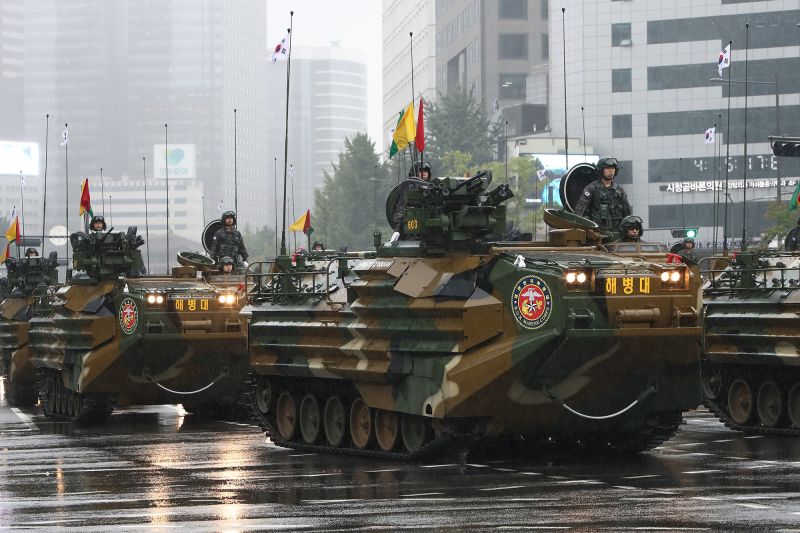
South Korea showcases missiles, drones and tanks in rare military parade
South Korea showcased an arsenal of advanced weaponry in a military parade on Tuesday, rolling tanks and missiles down the streets of its rain-soaked capital during the first event of its kind in a decade.
The parade, held to mark the 75th Armed Forces Day commemorating the founding of the country’s armed forces, comes against the backdrop of rising tensions on the Korean peninsula, as South Korea draws closer to the United States and Japan against the threat of North Korea’s accelerating weapons program.
The event kicked off in the morning with ceremonies and performances at the Seoul Air Base, where President Yoon Suk Yeol delivered an address warning Pyongyang against ever using nuclear weapons.
“If North Korea uses nuclear weapons, its regime will be brought to an end by an overwhelming response from the (Seoul-Washington) alliance,” Yoon said, speaking in the rain.
The parade – a first for South Korea since 2013 – followed in the afternoon, with troops and military equipment rolling through the heart of Seoul, passing by the city hall and historic Gwanghwamun Square. The roads were lined with spectators, many wearing plastic ponchos and holding umbrellas in the rain.
Several thousand South Korean soldiers and more than 300 US troops marched during the event, according to the Ministry of National Defense. Other performances included a military band, flag-bearers, and mascots from each military unit.
On display were a variety of homegrown equipment including drones, tanks and armored personnel carriers. Soldiers in vehicles waved to the crowd as they passed by; several carriers had the South Korean flag affixed to the exterior.
Peter Layton, a visiting fellow at the Griffith Asia Institute at Griffith University, said while the parade served to send “a message to an external audience,” including partners like the United States and regional powers such as North Korea and China, the event “is really about domestic factors.”
The parade and Yoon’s presence “help portray (South) Korea to the Korean people that the country is now an important power on the world stage, a pivotal global power as the current president calls it,” he said. It also boosts public perception of the Korean defense industry, which is “achieving remarkable export success” while other economic sectors fall flat, he added.
Yoon has previously stated his goal to make South Korea one of the world’s top four arms exporters, after the US, Russia and France. While it’s still a few places away in the rankings, the industry has grown rapidly, with $7 billion of defense exports in 2021, according to the Export-Import Bank of Korea.
Layton added that the parade also underscores South Korea’s enduring alliance with the US – with the two countries drawing closer, as well as with Japan, as North Korea ramps up its weapons testing.
International intelligence has also suggested since last year that Pyongyang may be preparing to resume nuclear testing, with satellite imagery showing activity at its underground nuclear test site.
In April this year, Yoon and US President Joe Biden announced a key new agreement that aims to deter North Korean aggression, including a new US commitment to deploy a nuclear-armed submarine in South Korea for the first time since the early 1980s.
Yoon, Biden and Japanese Prime Minister Fumio Kishida also held a historic summit in August, announcing new military exercises and a hotline for crisis communications. It marked the first time Biden hosted foreign leaders at the Camp David retreat in Maryland, a site of historic diplomatic negotiations for past presidents.
This story has been updated to more accurately describe the weapons on display during the parade.
